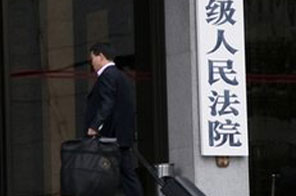China begins trial of 4 Rio Tinto employees
SHANGHAI: An Australian executive and three other employees of Rio Tinto went on trial Monday on charges of stealing secrets and offering bribes, as the head of the mining giant said his company was trying to resolve its troubles with China.
China's handling of the Rio Tinto case is seen as a litmus test by many in the foreign business community of Beijing's commitment to an open and fair environment for trade and investment at a time of rising frictions over currency policies and other issues.
"Last year saw four of our employees detained in Shanghai. This issue is obviously of great concern to us, as it would be to any company operating in China," Rio Tinto's chief executive, Tom Albanese, told a business forum Monday in Beijing. "I can only say we respectfully await the outcome of the Chinese legal process," Albanese said.
China has warned against politicizing the case, which has been an irritant in relations with Australia.
Australian citizen Stern Hu and three Chinese nationals were arrested nine months ago at a time when Rio Tinto was acting as lead negotiator for global iron ore suppliers in price talks with Chinese steel mills. Hu was Rio Tinto's senior executive in China in charge of iron ore.
The four were taken into a Shanghai court early Monday out of the public eye.
Australia's consul-general in Shanghai, Tom Connor, attended the session at the Shanghai No. 1 People's Intermediate Court, which was closed to foreign media. The Australian government has protested the court's decision to exclude its consular officials from parts of the trial related to commercial secrets, urging a fair and transparent handling of the case.
But China's legal system, like other parts of the government, is dominated by the Communist Party, an institution prone to secrecy.
Few details of the allegations against the suspects have been made public, and the four Rio Tinto employees have not been allowed any public comment since their arrest. Lawyers contacted before the trial began refused comment.
Australian Prime Minister Kevin Rudd said Monday that his government will be monitoring the trial closely.
"China has a different legal system to Australia. China has a different legal system to the rest of the world," Rudd told reporters in the southern city of Melbourne. "The world will be watching very closely how the trial is handled."
The trial is scheduled to last three days. But it is unclear how soon the court might issue a verdict, which sometimes come weeks or even months after a trial is held.
Almost all criminal cases that go to trial in China end in conviction. The maximum penalty for commercial espionage is seven years in prison if the case is found to have caused extreme damage. The maximum penalty for taking large bribes is five years.
Rio Tinto has urged authorities to handle the case quickly and openly. In the meantime, it is moving ahead with its business in China, the world's biggest steel maker and thus its biggest consumer of iron ore.
Albanese, in his speech to a high-level conference in Beijing, noted that China accounted for 24 percent of Rio Tinto's revenues in 2009, a "very large increase from five years ago."
"Only in the last year have we come upon some difficulties, which we are working hard to resolve," he said according to a copy of the speech released by the company.
Rio Tinto company recently appointed a new top executive for China and on Friday it announced an agreement with China's state-run aluminum giant Chinalco to develop an iron ore reserve in the West African country of Guinea.
China treats a wide range of commercial information as state secrets. Chinese reports that the Rio employees were originally suspected of obtaining state secrets suggest they may have been caught up in an effort to control information exchanged during the iron ore talks.
The trial begins as China is again bogged down in iron ore price negotiations with foreign miners.
China has sought to convince Rio Tinto and other suppliers to give its mills lower prices than those paid by Japan and South Korea. Miners reportedly are seeking price hikes of 90 percent or more this year.
Many foreign executives doing business in China are complaining of a chilling of what was once a warm welcome.
The American Chamber of Commerce released a report Monday showing a growing number of foreign businesses in China — 38 percent of those surveyed — feel shut out under new government policies promoting homegrown technology.
The chamber's data, gathered earlier this year from 203 companies, portrays a steadily worsening environment for foreign companies in China over the past three years. Only 23 percent said they felt unwelcome in the chamber's 2008 survey.
Foreign companies have played a critical role in China's industrial boom, providing massive financing and managerial know-how. They now are facing close scrutiny over how they conduct business, says Sang Baichuan, a foreign business expert at the University of International Business and Economics in Beijing, accusing some companies of using bribes to try to beat the competition.
"The impact of foreign companies on China has gone from positive to negative," Sang said.






